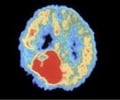A new drug known as JPC-2056 developed by the researchers at the University of Chicago Medical Center was found to be very effective in the treatment of toxoplasmosis.
The new study shows that the drug, known as JPC-2056, is extremely effective against Toxoplasma gondii, the parasite that causes toxoplasmosis, without toxicity."JPC-2056 has the potential to replace the standard treatment of pyrimethamine and sulfadiazine," said infectious disease specialist Rima McLeod, professor of ophthalmology at the University of Chicago and senior author of the study.
"The drug, taken by mouth, is easily absorbed, bioavailable, and relatively nontoxic. In tissue culture and in mice, it was rapidly effective, markedly reducing numbers of parasites within just a few days,” she added.
Untreated mice injected with the parasite "appeared ill," four days after the injection, the authors note, "with ruffled fur and hunched shoulders." Treated mice remained well.
"Studies in tissue culture found no evidence of the parasite or the plaques they produce 52 days after four days of treatment," said co-author Ernest Mui, a researcher in McLeod's laboratory.
"The absence of growth indicates that this compound is 'cidal' and not merely 'static' for the active form of T. gondii,” the authors of the study said.
Advertisement
"The drug's effect on the malaria and Toxoplasma enzymes is robust. It has much less effect on the human enzyme,” said McLeod.
Advertisement
The standard medicines to treat the infection can cause severe side effects and many patients become hypersensitive to them. There are no medicines that can eliminate certain latent stages of the parasite's life cycle. There is no vaccine.
This new class of medicine holds "considerable promise for significant advances in the treatment of toxoplasmosis, which damages the eye and the brain as well as malaria, which kills one million children each year,” said McLeod.
The study is published in PLoS Neglected Tropical Diseases.
Source-ANI
SUN/L







